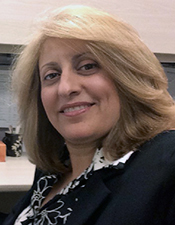FIMS News
Contact Information
Dean's Office
fimsadmin@uwo.ca
519-661-3720
FIMS & Nursing Building
Rm 2050
Graduate Student Services
fims-gradservices@uwo.ca
519-661-4017
FIMS & Nursing Building
Rm 2020
Undergraduate Student Services
macs@uwo.ca
519-661-3542
FIMS & Nursing Building
Rm 2001
Health Information Science in a clinical setting
 Two years ago Suhair Shanteer had a decision to make. Continue trying to get into the Canadian Medical Residency Program, which is the only way for internationally-trained physicians to obtain independent license to practise medicine in Canada - or leap into a new career.
Two years ago Suhair Shanteer had a decision to make. Continue trying to get into the Canadian Medical Residency Program, which is the only way for internationally-trained physicians to obtain independent license to practise medicine in Canada - or leap into a new career.When it became obvious that a move into the residency program was unlikely, Shanteer, a Jordanian-trained doctor, decided to move in a direction that would allow her to continue using her medical training in new and innovative ways.
And she’s just in time, as things are changing in medicine. As Canada’s healthcare system evolves, administrators are looking for ways to increase efficiencies and provide better patient care. To do this, they need reliable, accurate information.
Collecting large amounts of data is relatively easy these days, but for it to be of any use, it is critical to have someone who knows how to properly analyze and interpret it.
That’s where Shanteer comes in. The 44-year old graduate of Western’s Master of Health Information Science (HIS) program, jointly offered by the Faculty of Information and Media Studies (FIMS) and the Faculty of Health Sciences, is currently working as a Consultant in the Decision Support Department at London Health Sciences Centre. Her job involves using data to make evidence-based recommendations that assist in operational decision-making within the hospital.
“Like all industries and professions, healthcare is entering into its own information revolution, and with the remarkable advances in information technology and the increasing emphasis on scientific rigour and research-based evidence, comes the need for health information specialists who can serve as the expert on data,” says Shanteer. “The healthcare system relies on that data to perform and function effectively and efficiently.”
Shanteer explains that a typical work day is a mix of tasks that include consulting with clinicians, hospital administrators and other staff, and assessing what they need and how she can best assist them. She collects, analyzes and integrates data and presents the required information in a clear and meaningful format to help those in management make decisions. Many of the skills she uses daily were acquired in the MHIS program.
While her work is typically office-based, the analysis and recommendations that she produces eventually affect frontline patient care in the clinical setting. Her department is also responsible for evaluating hospital performance in relation to government standards, peer performance and historical performance.
The Health Information Science program was created in part to meet today’s need for people with Shanteer’s particular skill set. Launched in 2011, it is a joint venture between FIMS and the Faculty of Health Sciences. It includes master’s level and PhD programs. Currently there are 22 master’s students and 16 PhD students registered.
Professor Nadine Wathen, HIS program chair and one of its founders, felt Shanteer was someone who could capitalize on her pre-existing medical expertise, and combine it with studies in HIS to produce a professional with a uniquely valuable set of abilities.
“Suhair was in our first cohort of MHIS students. As a trained medical specialist, she saw problems ‘on the ground’ – places where some critical research could help bridge knowledge-practice gaps,” says Wathen.
“She paused her medical career to get a graduate degree that allowed her to explore a knowledge domain – in her case in the neonatal intensive unit – and learn how to apply research methods to understand a specific problem in that area, and develop solutions to start to fix it. Suhair was a wonderful student, and I expect great things from her as she applies her new skill set in the hospital environment.”
For her part, Shanteer says that HIS was a natural complement to her existing medical education, and has allowed her to carry out her responsibilities with competence and confidence.
“HIS provided me with the knowledge of healthcare informatics, knowledge translation, and data visualization principles and practice. It gave me the skills to identify data needs and determine appropriate sources of data, experience in quantitative and qualitative analysis, and the experience with basic and advanced statistical analysis,” she explains.
“On the other hand my medical background has helped me in providing the clinical perspective to clinical support tasks and facilitates the communication with medical staff.”
Courses that Shanteer found particularly helpful to her current career have titles like “Health Informatics,” “Interdisciplinary Issues in Health Information Science,” and “Information Visualization.”
Such courses are designed to educate students on issues specific to Canadian healthcare. Students come to understand the interplay of various disciplines, and how to crunch the numbers that will allow for better policy-making and clinical care. Wathen only sees the need for people with these types of skills growing in the future.
“As the Canadian health care system evolves to better integrate information technologies into the complexity of patient care and public and population health, we’ll increasingly need people with advanced education in not only IT systems, but ‘systems thinking’ - that is, people who understand the complex interplay between people, information and technology, and can critically engage with problems, and, especially, with solutions,” she says.


